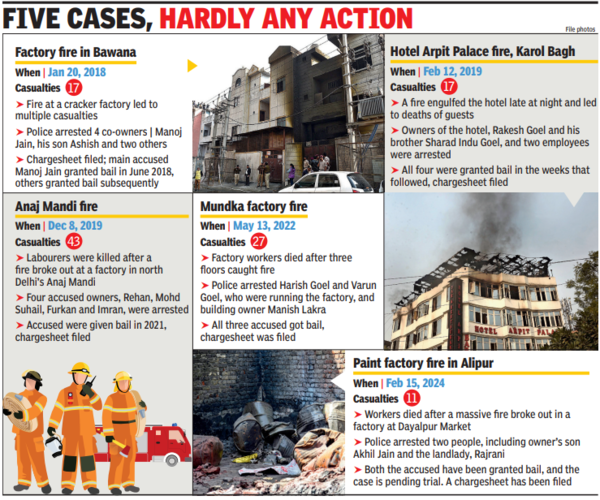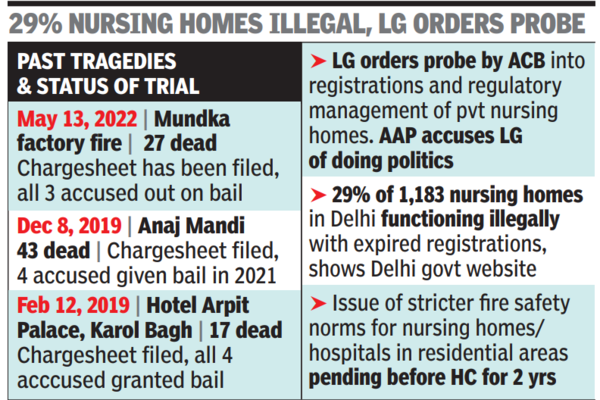Whether it is the case of a blaze at a hotel in Karol Bagh, which caused 17 casualties in 2019, or the Anaj Mandi fire the same year, in which 42 people were killed, the story is the same.Investigators agree that there can be hardly any deterrence in such a situation and that may be emboldening the culprits who have brazenly violated rules.
It’s not that the accused have been given bail mechanically. Shoddy investigation and laxity by authorities which contributed to such incidents happening have been highlighted by the courts before granting them bail. For example, the court had pulled up Delhi police, MCD officials and Delhi Fire Services while granting bail to two employees of Hotel Arpit Palace in Karol Bagh. It had observed that the officers from the agencies had committed criminally culpable acts by allowing the law to be flouted. But harsh words do not deter the offenders.
In the latest case of fire at a neonatal unit in Vivek Vihar, the entire machinery seems to have turned a blind eye to regulations and allowed the facility to function without any obstacles.
Karol Bagh to Mundka, a common thread — no end to wait for justice
From necessary permissions and clearances to grant of licence and absence of basic fire-fighting systems, there seems to have been brazen disregard of rules by all stakeholders. Even the illegal filling of oxygen cylinders allegedly happening there seems to have gone unnoticed or was winked at.
In January 2018, a fire ripped through a firecracker factory in Bawana, claiming 17 lives. The tragedy exposed lax safety measures, leading to the arrest of the co-owners. However, they secured bail with ease. After he was released on bail, the main accused, Manoj Jain, opened a firecracker factory in Haryana’s Kundli. In 2020, he was arrested by Haryana police for illegally manufacturing crackers and sent to jail, but he once again came out on bail. In July last year, Jain set up a new factory in Ghaziabad, which was raided by local police but Jain gave them the slip.
Just over a year after the Bawana incident, Karol Bagh’s Hotel Arpit Palace turned into an inferno in February 2019, trapping guests and leading to the death of 17 people. The hotel owners and employees were similarly in and out of jail, leaving the bereaved families in both pain and despair.
If the year had virtually begun with a tragedy of immense proportions, it ended with an even darker chapter in the city’s story of brazen flouting of all norms at the cost of human lives. In December 2019, there was a huge blaze at a factory at Anaj Mandi which manufactured school bags and shoes. Forty-three labourers were killed, exposing the vulnerability of those working in unsafe conditions. Arrests were made but the cycle of bail and pending trials continued.

It is pertinent to note here that in all these cases, it was the neglect of norms which led to casualties. A status report submitted to court in the Anaj Mandi fire, for example, highlighted glaring lapses on part of the owners. “It has emerged during investigation that the accused criminally neglected upkeep, especially the electricity layout, that too in a building where highly inflammable material was stored/used illegally. The building had two staircases. An alternative staircase was blocked and even the main staircase was not clear for free movement of occupants. The building was neither properly ventilated, nor compartmented, and also did not have fire safety arrangements. The occupants could not escape by themselves as the area near the staircase was involved in the fire and dense smoke filled the rooms completely,” said the report.
In May 2022, Mundka witnessed another factory fire engulfing a three-storey building and killing 27 workers. Both the owners of the factory and the building owner were apprehended, only to be released on bail. The same set of lapses – as flagged in other factory fire cases – were found to be the underlying causes for the casualties.
The fire at a paint factory in Alipur’s Dayalpur market in February this year followed a similar pattern. Eleven workers perished. Arrests were made but the accused are now on bail.
In most of these cases, particularly true of the neonatal facilities, the owners seem to be taking advantage of a loophole which allows them to operate without a fire NOC (no objection certificate) if their building is less than 9 metres in height. Most such facilities have restricted themselves to a maximum of two floors and function without adhering to basic safety norms.
